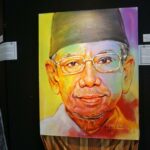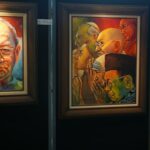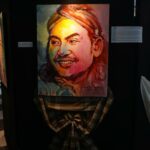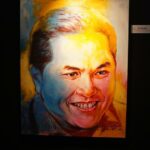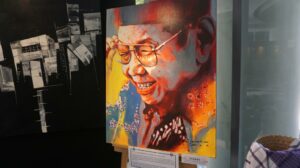
Collaborating with Ukhuwah Islamiyah Mosque of Universitas Indonesia (MUI UI) and Jejaring Duniasantri, Makara Art Center (MAC) UI was holding an art and cultural exhibition about the world of Islamic boarding schools. The exhibition, which was held on August 22–27, 2022, showed paintings by Emperor Nuno which depict figures who play a role in exploring a cultural and moderate understanding of religion. Some of these figures, including Dr. K.H. Ahmad Mustafa Bisri; Yaqut Cholil Quumas; Said Aqil Siradj; Erick Thohir; Yenny Wahid; Mahfud MD; Deddy Corbuzier, and so on.
In addition to paintings, various historical sarongs from the figures, such as the sarongs of Dr. K.H. Abdurrahman Wahid (Gus Dur); K.H. Hasjim Asyaari; K.H. Maemun Zubair (Mbah Moen); and K.H. Hasyim Muzadi were displayed in this event. Meanwhile, outside the MAC UI Building, the art installation “Sarong House” was exhibited with the house frame made of bamboo sticks as well as a roof and walls made of dozens of sarongs. Not only that, the trees around the MAC UI Building were also covered with sarongs.
According to Head of MAC UI Dr. Ngatawi Al-Zastrouw, S.Ag., M.Sc., the aim of organizing this exhibition is to spread religious narratives that are tolerant, moderate, inclusive. The potential of the world of santri (Islamic boarding school students) is very strategic to be disseminated in order to build moderate thinking. In addition, this activity is also expected to be able to explore tradition because the sarong is a symbol of the traditions of the Indonesian people. Sarongs that were previously identified only with Islamic boarding schools are now actually used by many designers to make various works.
“We take the philosophy of sarong, which is moderate, open, democratic and economical. It is moderate because everyone can wear it, male or female, rich or poor, regardless of gender and class. It is open because the sarong is easy to wear. Meanwhile, it is called democratic because sarong is clothing that has public value because it can be lent to anyone. Finally, it is economical and practical. Sarongs are cheap and easy to get. This sarong philosophy illustrates what we want to explore at this time, that we need an open, egalitarian, and moderate life,” said Dr. Zastrouw.
At the peak of the event, Saturday (27/8), there will be a performance by Inayah Wulandari Wahid, the youngest daughter of the Fourth President of Indonesia, Dr. K.H. Abdurrahman Wahid. In this monologue, Inaya Wahid will play a character of a lady with basket of sarongs who hawks her wares in and out of Islamic boarding schools every day, not to mention with her problems. “Monolog Negeri Sarung” is divided into three rounds. Each round is interspersed with “Tawashow”, which is a boarding school stand-up comedy whose name is taken from words in Arabic which means ‘advise’, and in English which means ‘laughter show’.
This “Tawashow” will display and explore typical jokes of Islamic boarding schools. Prior to the performance of “Monolog Negeri Sarung”, on the same stage there will be a series of Sekapur Sirih Kebudayaan Santri from Deputy Chairperson of the House of Representatives of the Republic of Indonesia Dr. (HC). H. Rachmad Gobel. This greeting is also an appreciation for the students, especially for Jejaring Duniasantri which is celebrating its 3rd anniversary.
Jejaring Duniasantri is a community that provides literacy to santri, especially in the world of literary writing, to spread narratives and discourses of tolerance, religious inclusiveness, and moderation. This community was formed because santri have an extraordinary role and potential for this country. They have narrative potential because santri master moderate and tolerant religious discourse. Santri also have potential good writing skills, so posts published on Jejaring Duniasantri website have an average of 3,000 viewers/day, which are read by people from 104 countries.
“With this event, we hope that students as the younger generation can understand and live up to the meanings of traditions that exist in Indonesia, especially the Islamic boarding school traditions and moderate religious traditions. In addition, it is hoped that the connection between the campus as an academic community and the world of Islamic boarding schools as a cultural-religious community can grow further so that there is synergy and mutual understanding between the two. We do not merely want to create an event, but also want to be able to create movement from this event,” said Dr. Zastrouw, who is also the Chairman of Board of Supervisors of Jejaring Duniasantri.

